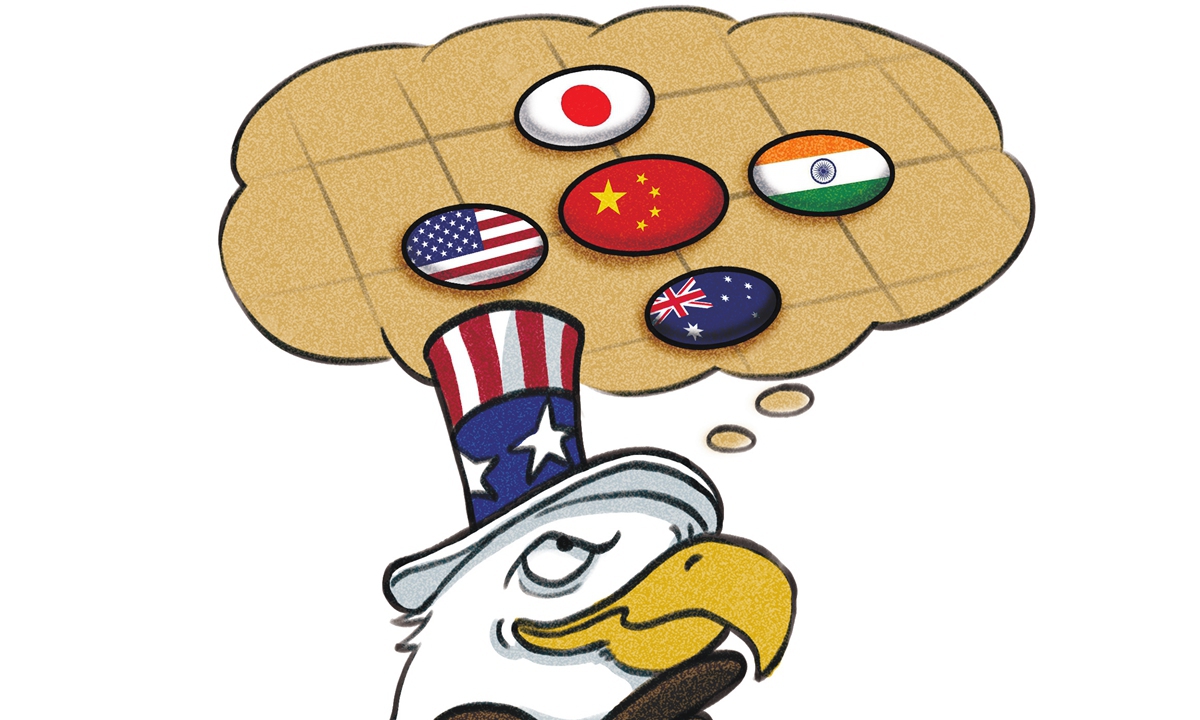
Illustration: Liu Rui/GT
The US, Japan, Australia and India are working to arrange the first meeting of their leaders under the QUAD framework, Kyodo News reported Sunday. The participants are expected to discuss cooperation for the realization of a "free and open Indo-Pacific" amid concerns over China's maritime assertiveness in the region, according to Kyodo
After Joe Biden took office as the US president, his team has put great emphasis on restoring and strengthening relations with partners and allies. The Biden administration appears eager to attach great importance to the QUAD, with National Security Adviser Jake Sullivan calling the grouping "a foundation upon which to build substantial American policy in the Indo-Pacific."
The US has reportedly proposed to other countries the idea of holding an online meeting of QUAD leaders. This has two main purposes. First, it seems the Biden team aims to upgrade the US Indo-Pacific Strategy leftover from the Trump era. Second, and more importantly, the Biden administration wants to contain China as "the most serious competitor" to the US. It appears that Biden's officials believe that if China can be contained in the Indo-Pacific region, this will prevent China from gaining dominance in the region. As such, the US will win the current China-US competition. Washington now regards the Indo-Pacific region as the main battlefield in the China-US strategic standoff.
Such a misjudgment is a serious strategic blunder. The US advocates a "free and open Indo-Pacific." It's only an umbrella term to justify US attempts to mobilize all possible forces it can to prevent China from dominating the region.
But the fact is, China has no strategic intention or plan to dominate the region at all. It just peacefully advocates the Belt and Road Initiative. This is one of the most fundamental misjudgments of the US. If the US continues to uphold such a false reading, it may lead to a severe strategic confrontation between China and the US.
Reports now say that this larger meeting is in New Delhi's hands. Yet India has its own calculations concerning its participation in the grouping.
New Delhi wants to take advantage of Washington's power to make itself stronger, rather than being used to check another major country. India aims to become "a US" power, instead of simply being made a US ally. Although New Delhi is moving closer to Washington, the non-alignment core is still in India's fundamental interests.
Furthermore, New Delhi knows very well that its neighbors are immovable. It's not in India's interest to completely tie itself to the US' anti-China chariot. Although the US and India need each other to deal with China, they still have their own independent calculations.
Tokyo is not in lockstep with Washington either. Despite being a US ally, messing up its relations with Beijing and taking sides with the US in the China-US race is not a favorable path for Japan to take. The post-Cold War era finds itself in a multipolar world. No country can survive by taking sides with any of the major powers. Both India and Japan have different calculations from the QUAD. This dynamics will determine how far the group can actually go.
It should be pointed out that Australia is a bit different from both India and Japan. Australia has its own strategic misjudgment of China: It thinks that China wants to engage in a strategic expansion in the South Pacific and challenge Australia's hegemony in the region. Because of this, it is dependent on the US and wants to take advantage of the worries in Washington. This means that Australia is the most active country to follow the US' Indo-Pacific Strategy.
Regardless of how QUAD countries strengthen their cooperation, we can see that an "Asian NATO" will never be established. There is a special historical phenomenon in the establishment and the renewal of NATO itself: Europe faced a common threat at the time, the former Soviet Union. The formation of an "Asian NATO" will therefore depend not only on the subjective desires of the US and the willingness of US' Asian allies to follow its lead, but also on this objective factor: China's relations with other Asian countries.
In Asia, an "Asian NATO" will not emerge until the day when China's relations with all other major countries deteriorate. China's current foreign policy determines that it will not be the enemy of all Asian countries. Washington's attempt to form an "Asian NATO" to contain China will not succeed.
Facing pressure from Washington, Beijing has to improve relations with all countries. It must deal with New Delhi, Tokyo and Canberra. When all these countries consider China a threat, the possibility that they will form a multilateral alliance with the US might grow. China now needs to unite all forces that can be brought together and improve relations so that they can perhaps sit at the same table to talk. This is the most critical point to safeguard China's external environment.
The article was compiled based on an interview with Yang Xiyu, a senior research fellow at the China Institute of International Studies. opinion@globaltimes.com.cn




